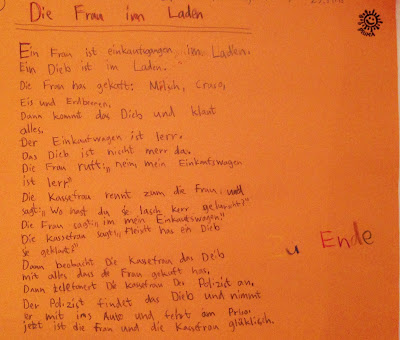 |
| Sentences Daphne copied directly from her "Mila" textbook. Copying text and taking dictation is a big part of the German curriculum. |
So, while her English reading skills have progressed to some degree since kindergarten, this has likely now leveled off at somewhere around average or below for her age. Her spelling has most definitely declined.
Meanwhile, Daphne's German reading and writing has made slow and steady forward progress, building in part on that rudimentary English literacy she brought with her to Luxembourg. But by nearly midway through second grade (almost a year and half of school in Lux), we hadn't heard her read or write more than a simple sentence or two at a time on her own in German.
But back to English for a moment: call us academic snobs, but it feels a bit uncomfortable when you realize your kid can't spell simple words in her native language that a nearly-8-year old "should" know. You can't help but cringe when you see it.
However, I think it would be hard for any parents to watch their child's skills decline while waiting for other skills to catch up. We're in an in-between period. It's expected, normal, and gives no cause for alarm, but it's still uncharted territory for us. Her peers back in Oregon are plowing through chapter books at grade level and above, while our daughter is only reading simple sentences in German--certainly not complete children's books. If she had stayed in the US, her English literacy would have likely continued to track at above average, whereas now it has plateaued at best, and significantly declined at worst.
Again, it's not bad. It's just strange to watch, and to think about the hypothetical, alternate-reality Daphne who is progressing nicely in English along with her friends. Add to that your own inability to help your child because you don't know the language she's learning, and it gets pretty weird.
 |
| From a poster she worked on in Sunday School (our church is in English). Of course, in German, the "w" makes a "v" sound. Don't ask me where the "n" came from. |
However, I think it would be hard for any parents to watch their child's skills decline while waiting for other skills to catch up. We're in an in-between period. It's expected, normal, and gives no cause for alarm, but it's still uncharted territory for us. Her peers back in Oregon are plowing through chapter books at grade level and above, while our daughter is only reading simple sentences in German--certainly not complete children's books. If she had stayed in the US, her English literacy would have likely continued to track at above average, whereas now it has plateaued at best, and significantly declined at worst.
Again, it's not bad. It's just strange to watch, and to think about the hypothetical, alternate-reality Daphne who is progressing nicely in English along with her friends. Add to that your own inability to help your child because you don't know the language she's learning, and it gets pretty weird.
But I'm writing this post because there are now signs that she's turning a corner, and we're about to witness a period of rapid growth in her German literacy.
The other day Daphne popped out of school and couldn't wait to show me a sheet of orange paper. On it was a story; one she had written herself, in German. As I mentioned, Daphne often wrote and illustrated very short, simple stories in English back when she was in kindergarten in the US, just as many small children enjoy doing as they discover and develop new writing skills. During this transition period in Luxembourgish school, she hasn't had the ability to write stories in either/any language.
Anyway, back to the orange paper. It's a simple narrative with a predictable plot. No screenwriters are banging down our doors. But it's a story, nonetheless.
To summarize: A lady is grocery shopping. There's a burglar in the store who steals all her groceries. The cashier calls the police and they catch the burglar, who goes straight to jail.
 |
| I'm sure there are spelling and grammar errors but I certainly can't tell the difference! |
And then, she read this story aloud from her textbook the other night:
Sure, they'd already read this story in class together. Yet to see her sit down and read with relative fluency is new, exciting, and very encouraging. You start to feel like this whole crazy experiment is gonna be worth it.
The point is, we're proud of this kiddo!
Of course, just when she starts getting the hang of German, they've now started learning French too...
To be continued!
The point is, we're proud of this kiddo!
Of course, just when she starts getting the hang of German, they've now started learning French too...
To be continued!

3 comments:
Hey, it's existing when they suddenly go from Mila and Salami and Salat to whole stories isn't it? I remember being worried about how basic the level was, and then amazed at how fast it progressed once the basics were in place (the fact that German is relatively predictable and phonetic helps). As far as other languages, I was 5 when we left Holland, and Dutch was all I spoke. I went into Kindergarten in Vancouver, learned to read and write English… and then as if by magic, once I was confident in English, I could do Dutch :-) I've spoken to others and I'm not alone, it just kinda seems to work that way. I'm guessing Daphne's English is suddenly going to make a great leap forward.
~ Evelyn
PS darn auto correct. Word number 3 should be EXCITING.
You read your story beautifully,
Daphers!
Nana
Post a Comment